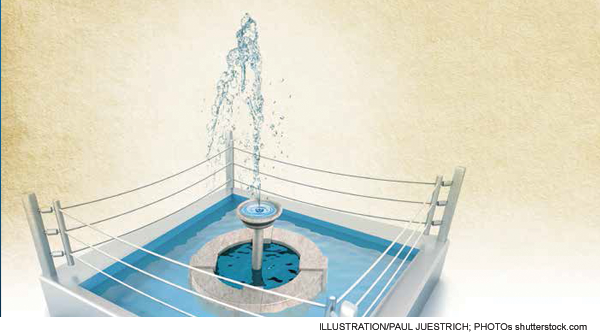

Explore This Issue
ACEP Now: Vol 33 – No 05 – May 2014In a boxing match, the divergent camps set themselves up in opposite corners. When it comes to the topic of anti-aging or so-called “fountain of youth” products and how they can impact emergency physicians, the camps could easily be described as combatants across the ring. In one corner we find advocates like Paul Kivela, MD, MBA, FACEP, who co-owns a boutique medical spa in Northern California that offers “age-management services” including hormone replacement. In the opposite corner we find people like Adriane Fugh-Berman, MD, director of PharmedOut, a Georgetown University Medical Center (GUMC) project whose mission includes educating healthcare professionals about pharmaceutical marketing practices, including those that push anti-aging services, such as hormone treatments.
In the middle is the question, do the benefits of hormone treatments (such as Botox injections, human growth hormone [HGH], and testosterone), skin treatments (Juvederm, laser therapy, non-surgical facelifts), and other “fountain-of-youth” products outweigh potential risks? Is the boon that can be increased vitality, faster recovery times from workouts and injuries, or potential weight loss worth the downsides reported in new studies that show increased risks for diabetes, joint issues, and heart conditions from using these products?
The muddled answer is: it depends on whom you ask. Proponents of said services say that, used correctly and under a physician’s care, they can be beneficial. Critics say the treatments—hormone treatments in particular—may have unintended long-term consequences that have not yet been fully studied, and that fighting aging is a losing battle that could have health risks.
Dr. Kivela, managing partner of Napa Valley Emergency Medical Group in Napa, Calif., and co-owner of the Elan Medical spa in nearby Fairfield, said emergency physicians have to decide for themselves if the services or products are right for them.
“I think everybody probably deserves a workup, particularly if you have any symptoms—fatigue, you’re not thinking as well, you’re not feeling as well as you think you should,” Dr. Kivela said. “It’s up to the individual to perform at their best, and I think some of these products and services can help people feel better. We blame a lot of cholesterol, high blood pressure, and depression on just getting old, and I think if you optimally manage those hormones, you can help mitigate those conditions.”
“The risk factors for me in the long term, in 20 years? I’ll be 80. If I can get a good five, 10 years of quality life, enjoying my children, enjoying my grandchildren, enjoying those around me that I care for—why not?”
—Juan Fitz, MD
Dr. Fugh-Berman, an associate professor in the Department of Pharmacology and Physiology and in the Department of Family Medicine at GUMC, said hormone treatments are not panaceas for aging and, like with all medical procedures or treatments, have potential downsides.
Pages: 1 2 3 | Single Page




No Responses to “Pros and Cons of “Fountain of Youth” Treatments”